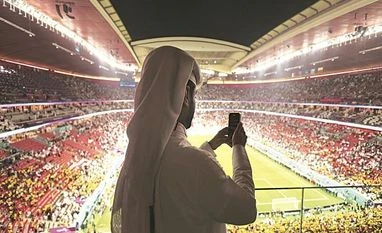Have you heard the official anthem for the Fifa World Cup 2022? There isn’t one; there are several.
The current edition of the FIFA World Cup boasts of an official soundtrack, instead of the usual official anthem that has long sounded the opening notes in the quadrennial football series’ global event. The soundtrack features artists like Jung Kook from BTS, Nicki Minaj, Trinidad Cardona, and Nora Fatehi, among others. The album so far has released four tracks, including “Light the Sky” which also has a section in Hindi performed by Fatehi.
According to media reports Jung Kook’s “Dreamers”, performed jointly with Fahad Al Kubaisi, became the fastest official FIFA World Cup song to reach No. 1 on iTunes Charts in the US. The song topped the iTunes Charts within only 2 hours and 11 minutes of its release on Sunday. Additionally, within just 13 hours, the single also reached No. 1 on iTunes Top Songs charts in at least 102 different regions, including the world's 8 biggest music markets, the US, the UK, Japan, France, Canada, Australia, Germany, and Italy.
The “Dreamers” video finds Kook and Al Kubaisi exploring Qatar, interacting with people, and immersing in the local culture. A serene blend of blue and gold, sea and sand, the video is indeed quite dream-like. But the focus squarely lies on Jung Kook. This is in keeping with what seems to be Qatar’s implicit message and theme for this world cup. From the dominance of Asian brands on its billboards and sponsorship cards to the inclusion of artists from across Asia and Africa in the soundtrack, promotional videos, and the opening ceremony, the hosts have so far presented an impressive showcase of Asian soft power and culture.
“Dreamers” isn’t the first football world cup anthem to achieve instant popularity. A crucial lynchpin for the cultural clout that the marquee football event usually comes wrapped in, the official anthem has consistently added to the iconicity of FIFA World Cups, whether it be Shakira’s “Waka Waka,” “Wavin’ Flags” by K’naan, or Ricky Martin’s “La Copa de la Vida.”
Shakira’s “Waka Waka” is arguably the most popular among all these. The official song for FIFA 2010, which blends an African Colombian rhythm with a Soca-influenced beat, proved to be very catchy and had broken records across the world almost instantly after its release. However, the song also struck a discordant note with South African people, hosts for the 2010 edition. Many felt Shakira was not the right person to represent the African nation, and that FIFA should have gone for African artists for the role. The song, which compares football players to soldiers on a battlefield and encourages them to fight for their goals, did not capture the South African sentiments of celebration, liberation, and community surrounding the game, several media outlets in the country reported. South African musicians were also unhappy over a lack of native acts at the FIFA World Cup Kick-Off Celebration Concert on June 10, 2010.
This is perhaps why Coca-Cola’s official anthem for the 2010 World Cup, a remix of Somalian-Canadian artist K’naan’s “Wavin’ Flag”, gained greater currency amongst African fans of the game. The song, which was originally written for Somalia and the aspirations of its people for freedom, was expanded to add lyrics like “let's rejoice in the beautiful game”, and “see the champions take the field.” The “Celebration mix” also added a new up-tempo and climbing pre-chorus, adding to the overall vibe of celebration and togetherness. This version reached number one in Germany, Switzerland, and Austria and number two in Italy, the UK, and Ireland.
Amongst the older songs, Ricky Martin’s “La Copa de la Vida” from the 1998 France edition has retained its iconic signification with the beautiful game, with chants of “Alè Alè Alè” echoing through the Luzhniki Stadium in Moscow as France beat Croatia in the finals of the 2018 World Cup. A song that redefined the career of the Puerto Rican singer, it falls in the samba-rooted Latin pop genre and was arguably the first to define a genre of “football” lyrics with lines such as “The cup of life, this is the one / Now is the time, don't ever stop” and “Nothing can hold you back if you really want it.”
Its several pop-culture references notwithstanding (Marvel’s Iron Man 3, Goal, Robot Chicken, etc.), the song’s continuing influence is perhaps most visible in yet another world cup song — “We Are One (Ole Ola)”, performed by Pitbull, Jennifer Lopez, and Brazilian singer Claudia Leitte. The 2014 World Cup anthem as a very similar-sounding chorus hook (Ole Ola against Alè Alè), often echoes Martin’s popular lyrics and keeps an identical arrangement of base melodies.
While most World Cups have featured multiple songs adding to the general chorus of fanfare — “sponsor’s themes”, “fan celebration anthems”, “official chants” — they primarily maintained one song as the official anthem. This seems to be lacking in the current Qatar edition. “The Business” by the Dutch DJ Tiesto is the official “walk-out song” for players. Nicki Minaj and Maluma’s “Tukoh Taka” is the official song of the FIFA Fan Festival. According to the official website, Fifa would be releasing even more singles down the line as the tournament progresses, promising to bring in more diverse voices from across Asia and Africa to the mix.
Unlock 30+ premium stories daily hand-picked by our editors, across devices on browser and app.
Pick your 5 favourite companies, get a daily email with all news updates on them.
Full access to our intuitive epaper - clip, save, share articles from any device; newspaper archives from 2006.
Preferential invites to Business Standard events.
Curated newsletters on markets, personal finance, policy & politics, start-ups, technology, and more.
)